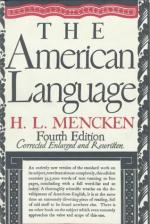|
This section contains 362 words (approx. 1 page at 400 words per page) |

|
Chapter 3.2 Summary
All the pretense and nationalism of American writers, says Mencken, was not to "protect" American speech but to protect American belles letters, what were known as "beautiful letters," quality literature. While a few bold and defiant ones remained faithful to American, then, the majority of writers were hungry for acceptance. Men such as Fowler or Griswold, he says, "followed in the steps of Macaulay" and other English writers. At the same time, writers like Robert Lowell and Walt Whitman were determined to break from the traditional and conventional. They experimented, challenged, and reached for new means of expression. These new changes in literature reflected the new and continued changes in language and speech. They fulfilled the wishes of Walt Whitman's innovative dreams, dreams that Whitman acted on in his own work, wherein the man of letters invented new words, coined new phrases, and...
(read more from the Chapter 3.2 Summary)
|
This section contains 362 words (approx. 1 page at 400 words per page) |

|




